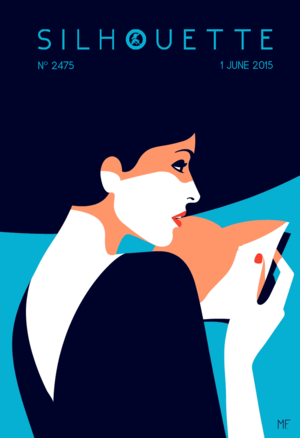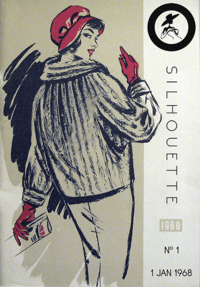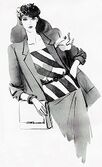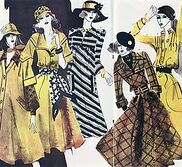Silhouette (magazine): Difference between revisions
mNo edit summary |
mNo edit summary |
||
| Line 8: | Line 8: | ||
| category = General interest | | category = General interest | ||
| frequency = Weekly | | frequency = Weekly | ||
| total_circulation = 7 | | total_circulation = 7,7 million | ||
| circulation_year = | | circulation_year = 2020 | ||
| founder = Nan Şernéy | | founder = Nan Şernéy | ||
| firstdate = 1 January 1968 | | firstdate = 1 January 1968 | ||
Latest revision as of 20:15, 5 June 2020
 | |
 The 1 June 2015 issue of Silhouette, cover by Mireille Fontaine | |
| Editor | Nare Nazlikian |
|---|---|
| Categories | General interest |
| Frequency | Weekly |
| Total circulation (2020) | 7,7 million |
| Founder | Nan Şernéy |
| First issue | 1 January 1968 |
| Company | Silhouette Publications SàRL |
| Country | |
| Based in | Senik, Alţira |
| Language | English |
| Website | http://www.silhouettemag.gls/ |
Silhouette (Gylic transcription: Siluét) is a Gylian general interest magazine, founded in 1968.
It publishes journalism, commentary, fiction, satire, poetry, and essays covering many topics, ranging from daily life and clothing to popular culture and politics. It is famed for its gauchic illustrations, experimental typography, and demopolitan worldview.
It considers L'Petit Écho its "sister magazine".
History
Silhouette was founded by Nan Şernéy (b. 1940). She was inspired by the success of L'Petit Écho and sought to create a "brash and cheeky" alternative to it.
The first issue was published on 1 January 1968. It was an immediate hit, and became one of Gylias' most successful magazines, with a circulation of 2–3 million in the 1970s.
Silhouette established close relations with L'Petit Écho, which embraced it as a "sister magazine". Sima Daián commented that the two, with The Travelling Companion, best captured the ideal of aristerokratia, serving as an inclusive and egalitarian equivalent of a café society or jet set for ordinary Gylians.
It was affected by the wretched decade, with stagnating circulation figures, and a loss of its cutting-edge feel. Nan stepped down as editor-in-chief in 1980, and her successors tried to stabilise the magazine's situation.
Silhouette rebounded in the 1990s, buoyed by renewed economic growth, national optimism, and a second Gylian Invasion. It switched to digital printing, restored its dynamism thanks to an influx of new contributors, and embraced the internet in Gylias — digitising its archives through BiblioNet and beginning to publish exclusive features on its website.
Its online presence also helped grow its international audience.
Ownership and organisation
Silhouette is owned and published by Silhouette Publications, legally constituted as an SàRL. Its headquarters are in Senik, Alţira.
The magazine has a 5-member Management Board and a 10-member Supervisory Board, elected yearly.
The magazine's revenue comes from newsagent's sales, paid subscriptions, online orders, and donations. Donors are listed at the end of each issue. It does not accept advertising.
Content and style
Silhouette publishes articles, essays, reviews, fiction, and poetry. It covers an eclectic array of topics from daily life. Profiles and interviews spotlight both famous Gylians and interesting residents of Senik.
It features lavish illustrations in a gauchic style, generally of the Eastern school.
Well-known features include "Varueations" (a French pun roughly meaning "Street variations"): illustrated psychogeography vignettes with experimental writing, playfully exploring city life.
Silhouette is written in English. Its writing style is characterised by playful voice and mischievous humour. It is known for using custom typefaces, lending texts a calligraphic appearance, and experimental layouts, arranging text to form calligrams and combining text and illustration to psychedelic effect.
Its distinctive worldview is influenced by demopolitanism and anarchism. Many of its articles and letters from readers contain do it yourself tips or anecdotes. Politically, it has generally supported the PPFN, LSDP, and LND.
Its logo depicts a feminine figure wearing a wide-brimmed hat and evening gloves enclosed in a thick circle. The front page has featured the French slogans élegance aver effleurement ("elegance with a light touch") and élegance avec effronterie ("elegance with cheek"), reflecting its identity.
Contributors
Notable contributors have included Annemarie Beaulieu, Ðaina Levysti, Nora Gunnarsen, Mireille Fontaine, Miyuki Morimoto, Alessandro Rocca, Lerse Peliḑ, Deneli Zaryş, Susan Wallace, and Helen Wilkinson.
Influence
As one of Gylias' most-read magazines, Silhouette has achieved notable influence in pop culture, and become a pre-eminent forum for serialised fiction and poetry.
The magazine is an iconic representative of socialised luxury, and is known as a leading publication for georgette audiences. For its international readership, it is a "quintessentially Gylian" magazine, typifying the fusion of radical egalitarianism and sophisticated style associated with Gylias.
The philosopher Margot Fontaine praised the magazine and its "sister" L'Petit Écho as an example of her ideal of l'pays jolie. She described them as "an opportunity for Gylians to carve out a corner of national self-respect by demonstrating their capabilities in the good life and the arts, rather than on a battlefield or pointless international chest-thumping."
Rasa Ḑeşéy's documentaries The Hurried Province (2008) and L'entrégion (2010) examine Silhouette's influence on regional identity in Alţira and Arxaþ, its role as a regional voice, and its notably positive stance on Molisentismo.



